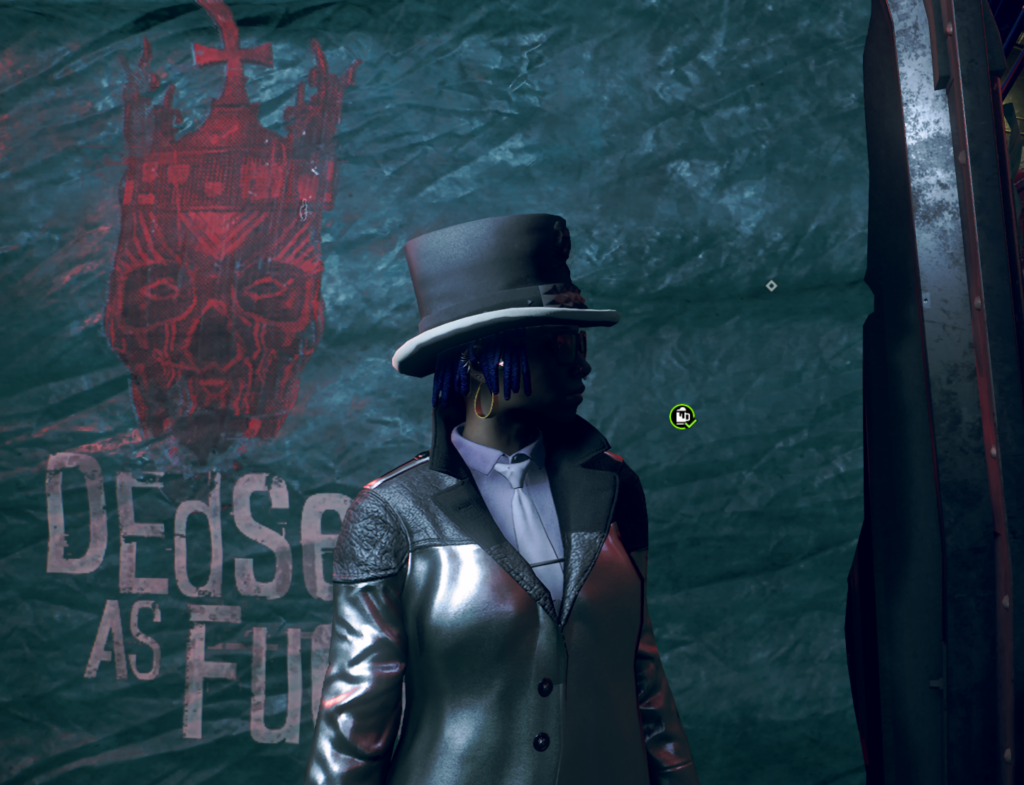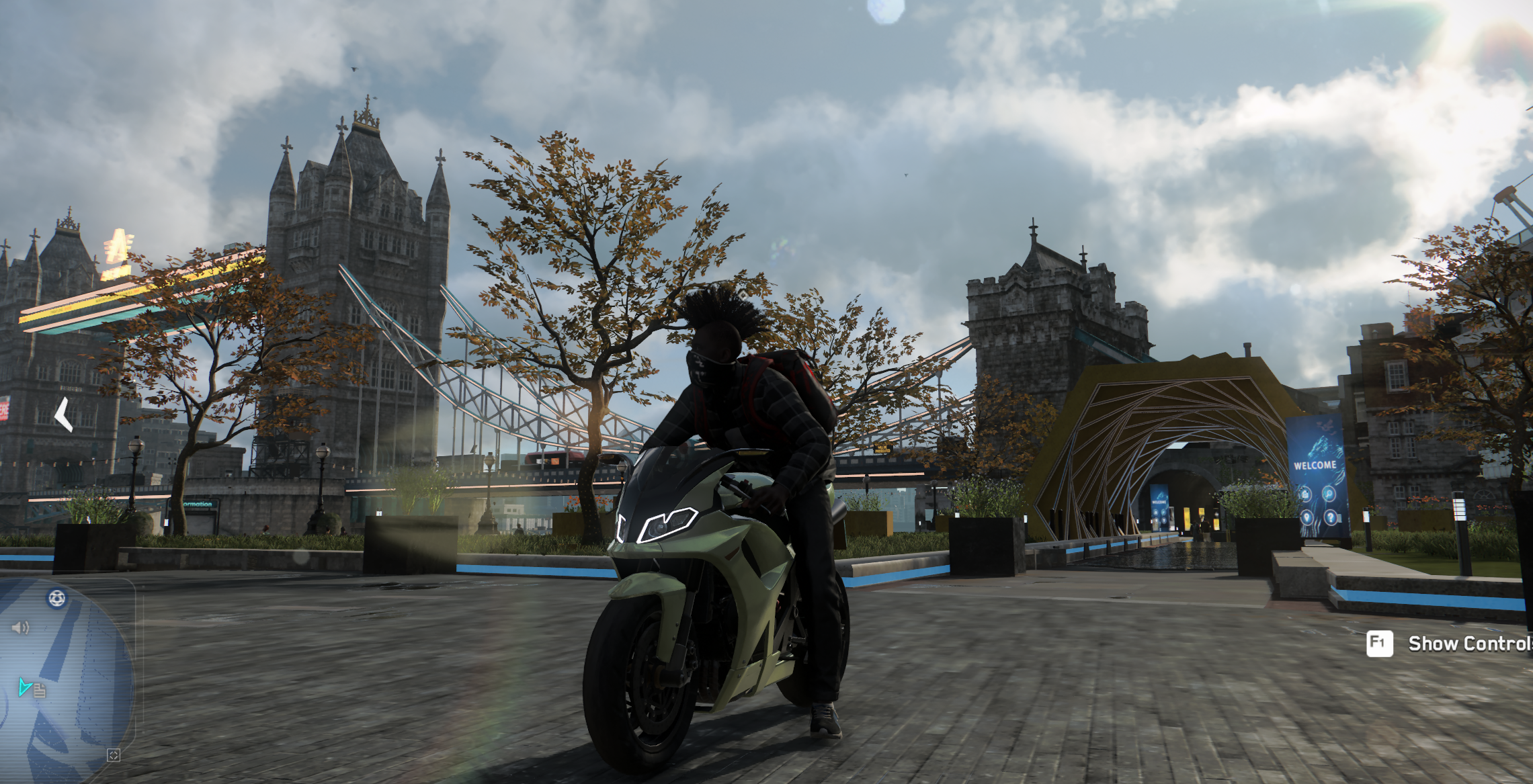I recently completed this game on PC, having played the previous two on console. An edited-down version of this was cross-posted to Steam.
I’m a huge fan of this franchise. The first game especially was an underrated true-crime thriller game that I called “Grand Theft Splinter Cell,” which sums up the value proposition clearly, some of this, some of that. Watch Dogs’ twist was a sexy, cerebral addition to the gameplay where the player used stealth, planning, and hand-to-hand to defeat challenges, but also elaborate traps made from the connected city itself–essentially as a super-vigilante whose power was “hacking,” which is to say the ability to control any electronic apparatus in the environment to his advantage: pipes explode, electrical plates shock, automobile barriers raise and lower, cars drive themselves forward and backward, running over enemies, manhole covers explode with steam buildups, knocking pursuers off the track.
Nothing is quite so satisfying as defeating enemies with a combination of interdependent traps–sometimes, given the right drone positioning, of jumping from one camera bank to another, it wasn’t even necessary to put oneself in danger. Watch Dogs 2 and now Legion, the third in the series, continues the tradition but anticipates a certain limitation in the previous games: not so much of the world is actually ‘wired’ yet. In Legion, we advance the clock forward to the near future, where the connected city both becomes more plausible technically and offers more points of contact for our vigilante, now a full, multi-member hacker collective dedicated to the overthrow of a sinister and corrupt British government.
The story, as is usual for a Watch Dogs game, is very good. The world is well-realized and feels believable; ripped from a headline that has yet to be written. We’re seeing a view into what future London will probably look like (hopefully not politically), drones patrol the skies, keeping the peace, delivering packages and working construction projects, meanwhile self-driving EVs, empty taxis, and gig workers on scooters make up the bulk of vehicle traffic. It’s a city of immigrants, of technical specialists and high-tech professionals on the one hand, transients, gangs and gladiators on the other. In between, a privatized security force keeps the peace by way of a thickly-soled boot, a baton and an armored vest, and the means to call the aforementioned drones as the extension of their fist. The only thing worth a damn is the data.
The game itself is surprisingly complex–there’s a learning curve to the way the world operates, which handles and buttons and control which traps and levers, what can be done with a door, a drone, or a car, and how violently. But it is consistent and easy enough to learn but has a lot of detail and nuance that reveals as you progress.
There is a lot to learn, and perfect here. The basic fact is, you should be loading up on tech points, the closest proxy to experience, early, and robbing them from every rooftop you can find. Get the digital camouflage shroud early to cover your kills–this game is as much about avoiding unnecessary trouble as it is winning a confrontation. You will have to learn early to be methodical and sneaky, to only physically enter the spaces you need to. Going in guns blazing will have you running out of operatives quickly.
Did I mention operatives? This game has you act not as an individual, but field a full team of operatives that you choose from the population of London. This is easily the most fun part of the game. You will regularly be on a mission when you spot someone who, after being scanned, reals that they have critical skills, security clearances or equipment that can be put to use later, and the entire mission changes to recruitment. Playing an permadeath mode extends the intensity of these choices, because these characters will reliably die if you put them in difficult situations. Because the game has no real individualized XP system, these deaths aren’t showstoppers–minor inconveniences most of the time.
And you are really outgunned here. Three Riot drones and a few armored cops will spell the end of you, and they are everywhere. Many of the cops are armored and you’ve typically got vegetarian ammo, single shot most of the time. Even with a (nonlethal) assault rifle and grenade launcher loaded, you are not armed up for most confrontational situations. There’s a lot of room for improvement on the guns, actually. The game has a unique (and bizarrely inconsistent) morality to the whole thing that suggests that nonlethal ammo is preferred, even when ineffective, but mowing down civilians left and right with your car or motorcycle as you rush to the next crisis carries no visible consequence. It’s pretty easy to find paintball guns and dart guns but, it being London, lethal weapons are comparatively difficult to find, (even while your enemies are dropping them everywhere, apparently.)
A cool detail is that you do alienate individuals, for example it might say of someone “Had their back broken by [your!] operative John Jones” because you hit someone in traffic several missions ago. This makes them both un-recruitable and also more likely to attack. But this is on an individual basis, DedSec’s overall popularity with the city as a whole isn’t really a noticeable thing, (or if it is, it isn’t clear) meaning you can play as evil as you want, really. This is too bad, as the city does feel alive, and reactive. More could be done here.
A truly excellent flip-side to this is that civilians are real–you can see the same person several times in different parts of town–and have real relationships with other citizens. That means you can–and sometimes do–rescue your agents’ accountants, roommates, and relatives, because the relationships are visible to you on your profiler. This is a fantastic level of detail when it happens, and really underscores how interrelated the characters and the city are. Obviously when I see some cops hassling my teammate’s girlfriend or relative, I drop what I’m doing to fuck up some cops. This is a valid use of my organization’s time. Indeed, it’s often a shortcut to recruiting someone who is more likely to join up.

The recruitment mechanics are where the game both shines and where they’ve left the most money on the table. Firstly, there is very little difference in recruiting one candidate over another. Civilians don’t have RPG-style stats, just perks and carry-slots, and they don’t improve with experience or usage. This means, in practice, an unarmed senior citizen can be equally lethal to a hitman in hand-to-hand, with access to the same repertoire of moves. All of them are essentially equally good at hand-to-hand combat, as fast and as strong as each other, with notable exceptions that are expressed mainly as special powers or special vulnerabilities. Recruiting an MMA fighter to my team is an interesting idea, but the truth is the best fighter on my team, in terms of the most survived fights, ended up being a 23 year old executive assistant with no special characteristics. This could really be a lot better. There is no real XP system to speak of, and no way to spend it or spread it out among your members, which is an obvious omission when you see how detailed their activity logs are. The system keeps a narrative record of everything your team members did, every civilian they injured, every bad guy they killed, every mission they completed. None of it counts for anything in terms of their character growth. Too bad.
Accordingly, since no one is meaningfully better than anyone else, there is no reason to not just use the same character the whole time, if you can. Obviously you become injured, so this is unlikely. Everything they do is recorded, which is awesome, but not really leveraged in any meaningful way. If all these features were enhanced, this would go from being a pretty good game to a spectacular game that would be extremely engrossing and addictive–especially with permadeath on. Leaning more into those RPG mechanics would really take this across the edge. Not a lot, just enough to have one character be different from another, and have experience count.
